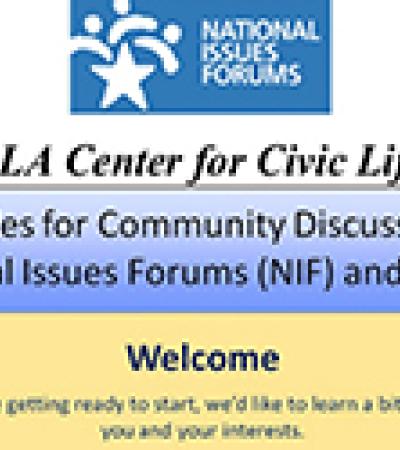The Independence Public Library hosted a topical debate between Kansas Sen. Jeff King and the Independence Community College (ICC) Debate Team over a Kansas law that targets many underserved citizens. King’s 2013 Senate Bill 149, which passed the House and Senate by large majorities, allows officials to order a drug screening if they have a "reasonable suspicion" that an applicant or recipient of the benefits is using a "controlled substance." The audience discovered both sides of this hot-button, relevant issue in an organized, scholarly debate.
Advanced Planning
We hosted Changing America — an ALA, National Endowment for the Humanities-funded traveling exhibition that discusses the Emancipation Proclamation and the 1963 March on Washington — following a year of highly motivated demonstrations and the emergence of the Black Lives Matter movement. The library wanted to host a program that drew a connection between those current events and the historical events highlighted in the exhibition. A debate allowed for scholarly, organized discussion over issues affecting many Kansas minorities.
First, I contacted the community college debate coach to schedule a meeting. The coach was immediately on board, and we discussed debate topics and format. He recommended the legislator pick the topic he or she felt comfortable debating. After meeting with the coach, I began researching local politicians. I emailed the three state politicians who represent the library's patrons, asking for their involvement with pre-planned event details. King volunteered and decided on his 2013 SB 149, a bill that involves drug screening for recipients of state assistance and unemployment benefits.
The program was held on Aug. 27, 2015, and the planning process took about three months. The complexities of the politician's schedule made planning difficult and delayed. The date for this event changed three times due to legislative involvements. IPL's Changing America had 11 programs involving government officials and distinguished professors located three hours away. Planning for the events began seven months in advance of receiving the exhibit to accommodate presenters’ schedules and allow for adequate marketing.
Marketing
Due to partnering with King and the ICC Debate Team, we were able to receive a large amount of free marketing for the event. Both the community college and senator posted information about the event (as well as a link to IPL's Changing America page) on their websites. The college also advertised the event through their social media, school paper, online calendar and email blast. Three area newspapers ran articles leading up to the event about SB 149 and the Changing America event. The library purchased a display ad in the local newspaper that ran the Sunday and Tuesday before the event. We exploited the event through our social media pages, email blast, circulation handouts and through the Chamber of Commerce.
Budgeting
For this event, our budget was relatively low. We spent $49 on the newspaper display ad and $50 on refreshments such as tea and punch from a local bakery. Both the debate team and King volunteered to participate in the event free of charge. The event space was in the same place as the exhibit, so we didn’t have to rent a space. A local liquor store donated wine for the event as well.
Day-of-event Activity
The morning of the event, I contacted the debate coach and senator to confirm the time and location, as well as to answer any last-minute questions. I set up 50 chairs for the event and provided the senator and debate team tables, chairs and a podium. I spent time finalizing my introductory speech, as well as practicing it before the event. The majority of the day was spent gathering Changing America marketing materials to have available to hand out at the event. Because the majority of this event is about pre-planning, the day of the event should be stress-free and easygoing, with nothing major to worry about.
Program Execution
The execution was simple. There was one glitch, which was the need to deploy more seating because attendance was higher than expected. We also had to delay the event to allow for people to make it through the door and find seats.
Before the debate, I spoke with King and two ICC debaters to ensure they were comfortable keeping their own time. A stopwatch was provided at the podium for the current speaker. Fifteen minutes after the scheduled start time, I began introducing the debaters. There was no need for a moderator because the debaters and audience were aware of the format. King spoke first, and I welcomed him to the podium after my introductions. The debate went as followed:
- 20 minutes: the senator explains the bill and his support
- 20 minutes: ICC's rebuttal
- 10 minutes: senator's response
- 20 minutes: ICC's closing
- 10 minutes: senator's closing
At the end of the debate, I thanked each of the participants, recognized the entire ICC debate team and invited the audience to enjoy refreshments.The library also used the evaluation forms provided by the Changing America grant. The clean-up was brief and included stacking chairs, picking up trash and washing what few dishes were used.
Advice
Start early and be open to change. Working with a politician involves patience and lots of flexibility to get anything accomplished. Make sure to give the students adequate recognition because this is a big deal to them; they are debating a recognized community leader and elected government official. The night of the event, be sure to have extra seating readily available. Most importantly, stay organized throughout the whole process! This is the key to a successful event because it reduces stress and allows you to enjoy the program.



